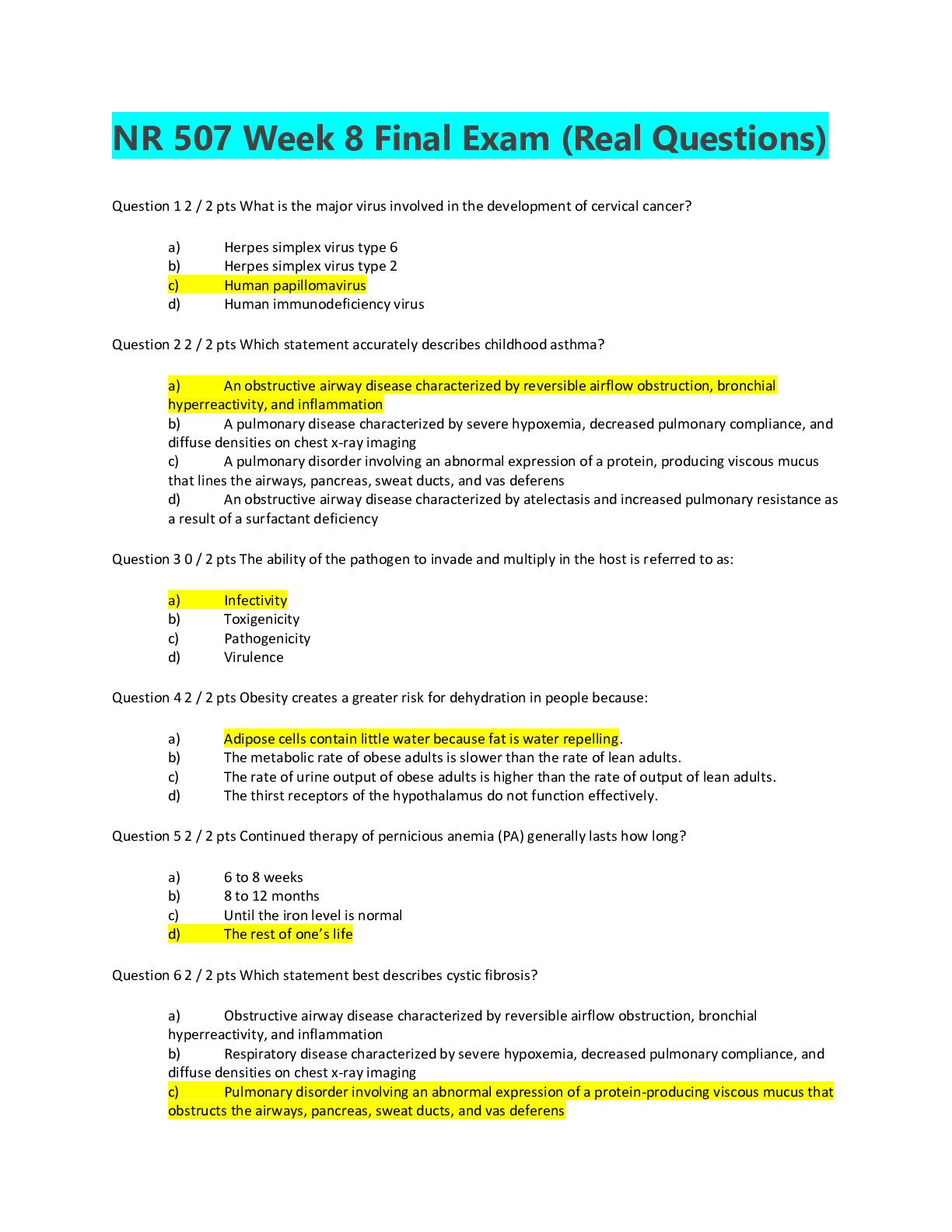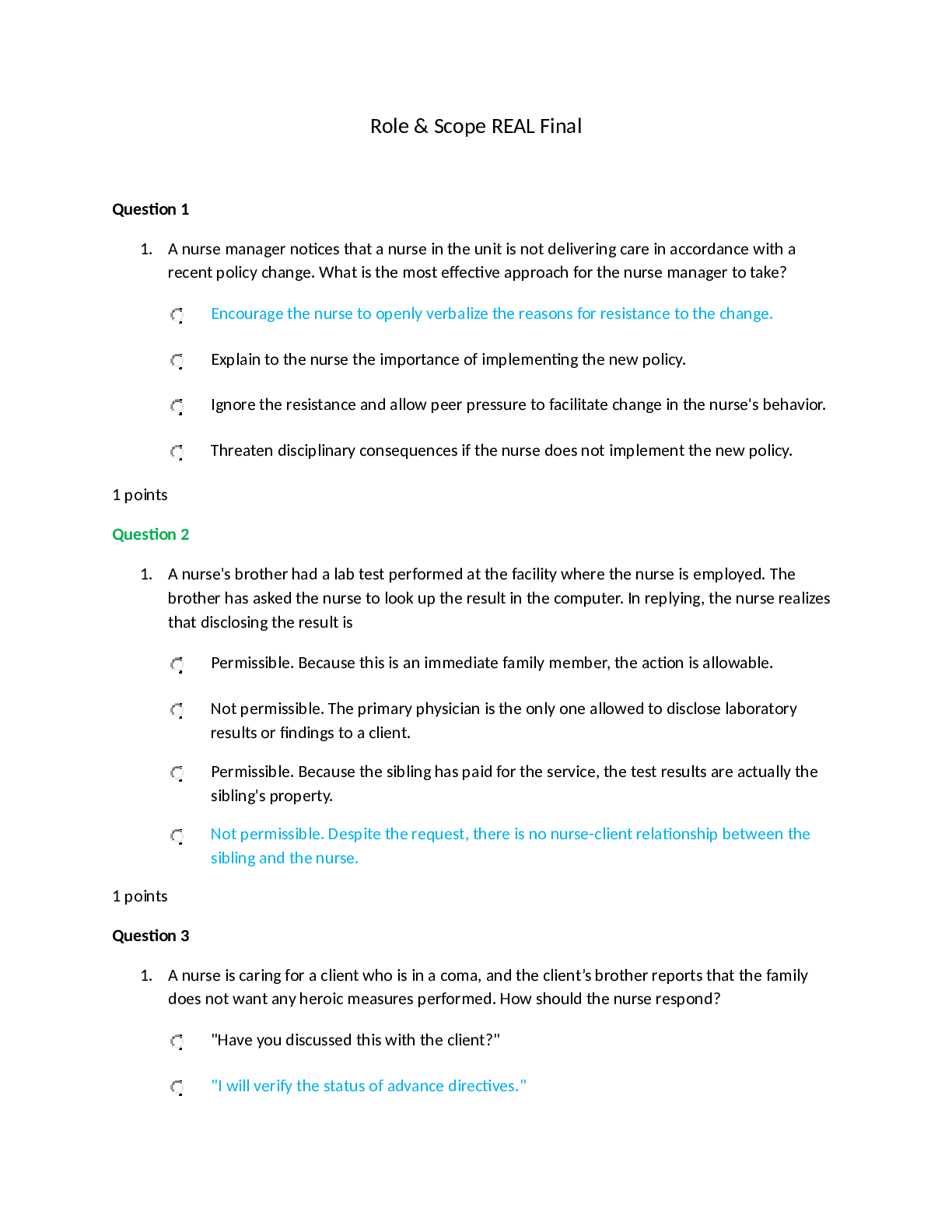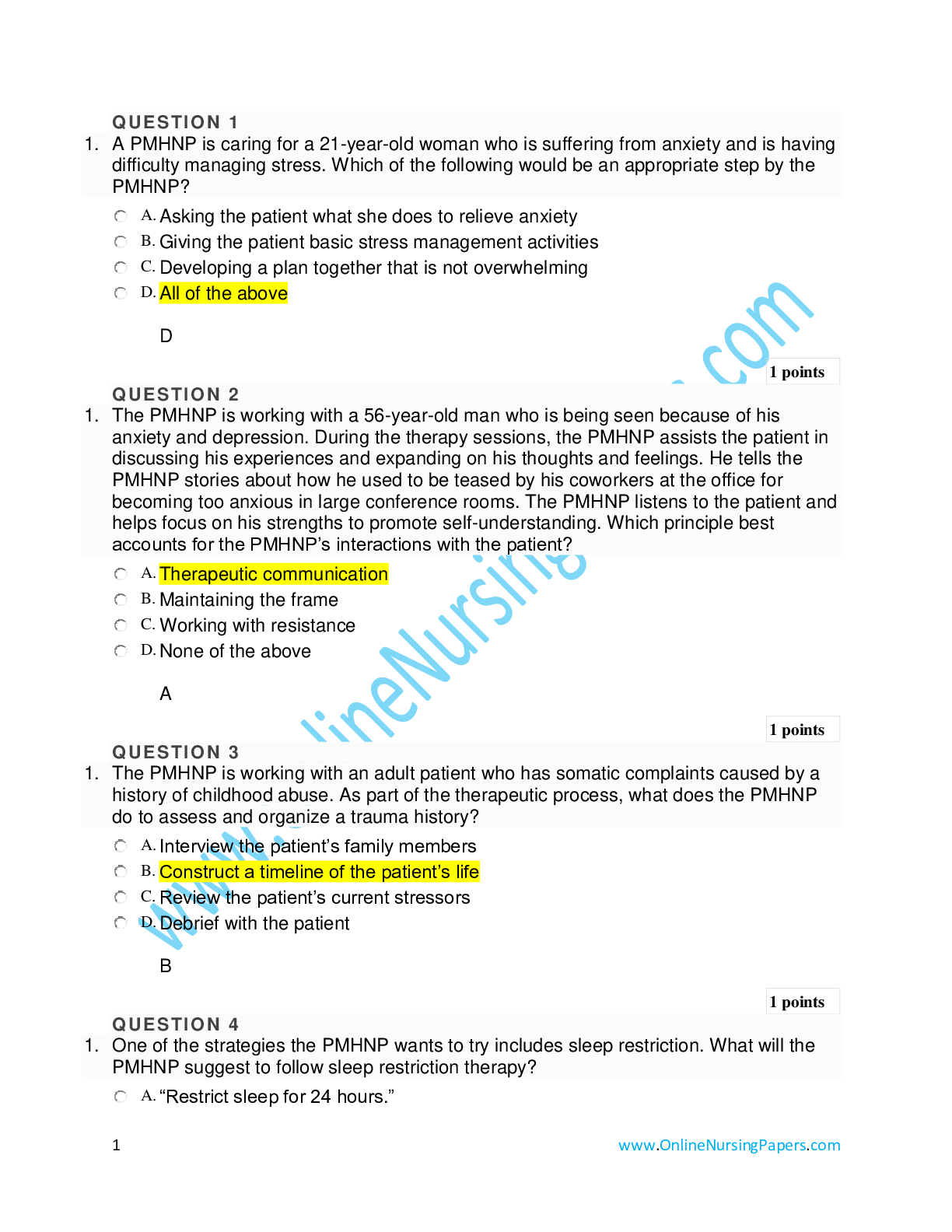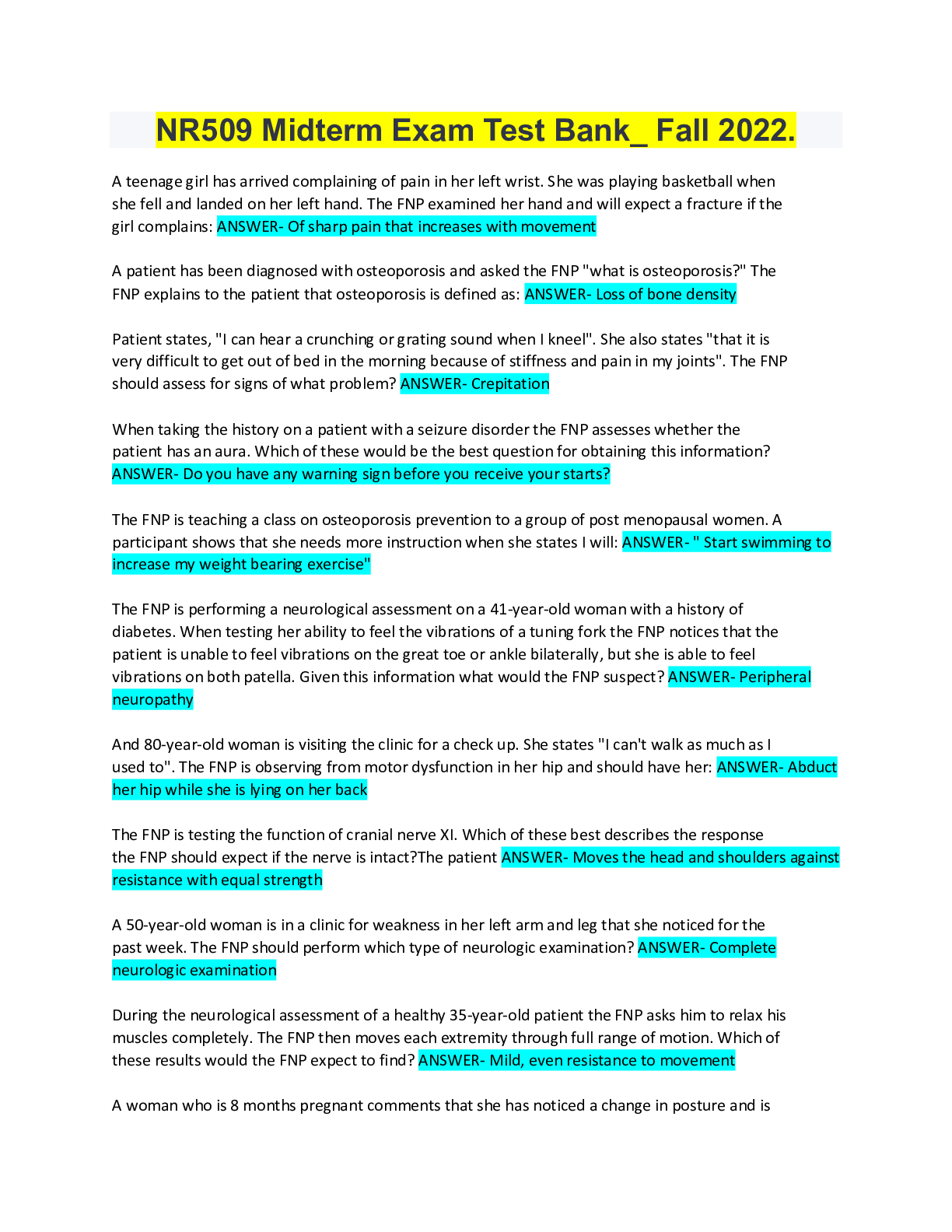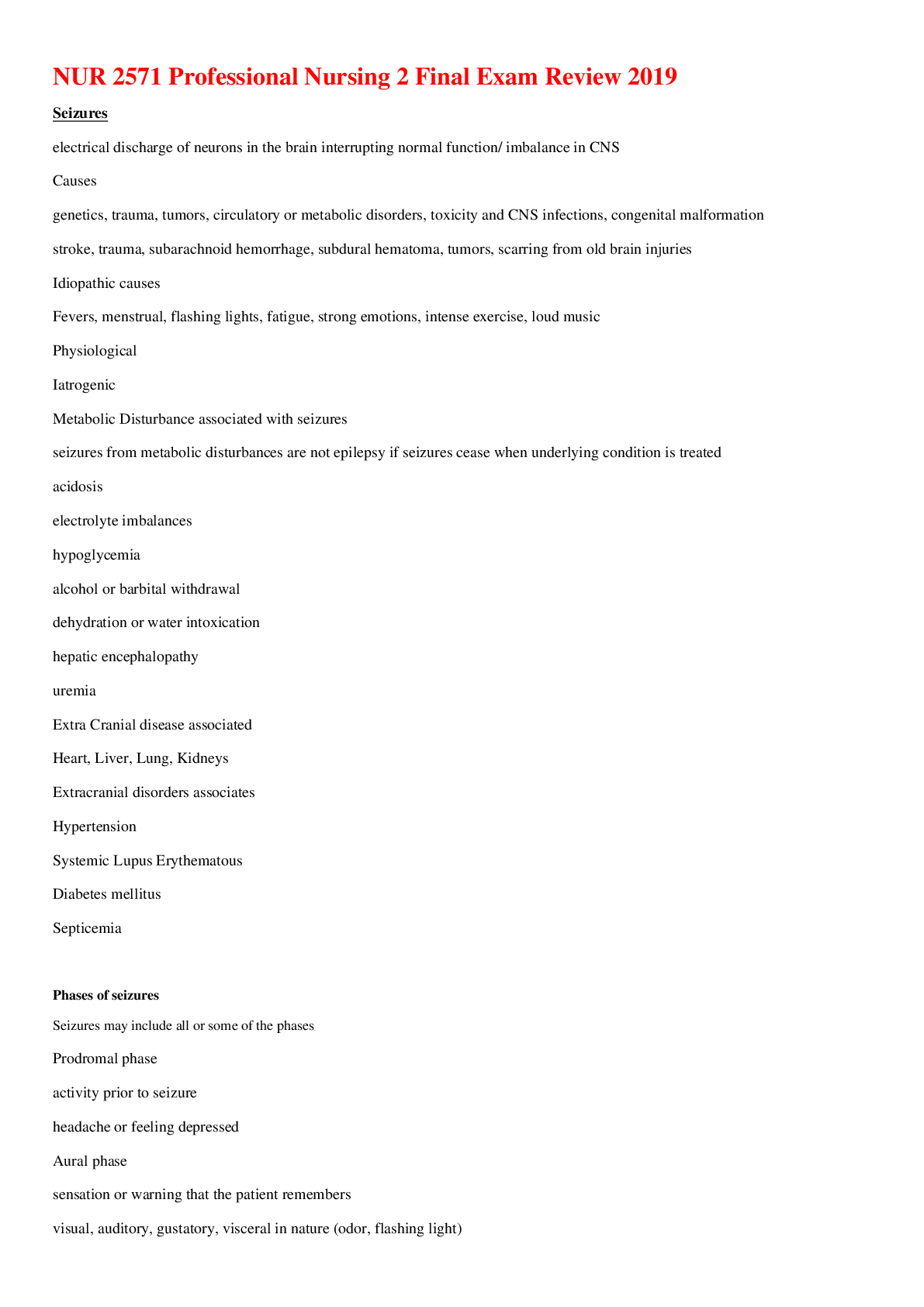*NURSING > Final Exam Review > NURSING 2 _ Nursing 2 Final Exam| Rasmussen College, Bloomington - NURSING 2 Final Exam (A+ guide) L (All)
NURSING 2 _ Nursing 2 Final Exam| Rasmussen College, Bloomington - NURSING 2 Final Exam (A+ guide) Latest solution Fall 2020.
Document Content and Description Below
Nursing 2 Final Exam BPH: benign prostatic hypertrophy: enlargement of the prostate gland due to overgrowth of cells; compresses urethra; blocks urine • Pt Ed [BPH]: need to take meds consistent... ly, avoid large quantities of late evening fluid intake, empty bladder right before bed, empty bladder regularly, if needing surgery - teach patient that there may be changes in sexual function • What to ask BPH pts: how is there urinary function (ease of starting, strength of stream, amount urinated, residual in bladder)? • Cardura (Doxazosin): Improves urinary flow immediately o Monitor pulse and BP Diverticulitis: the inflammation of one or more diverticula in the colon • Contraindications: barium enema (due to risk of contamination if perforated) • Pt ed: Increase activity, increase fiber, and decrease processed foods o Avoid contact sports Crohn's disease: chronic autoimmune inflammatory bowel disease with relapses; most often found in the ileum and in the colon • Meds: antidiarrheals (Immodium), antibiotics (reduces harmful bacteria, reduces fistula drainage), immune suppressants, anti-inflammatories, pain relievers, iron supplements, vitamin supplements. o Meds are long-term to keep patient in remission. • Diet: limit dairy, low fat foods, limit fiber, eat small frequent meals, increase fluids, nutritional supplements • Testing: occult blood, colonoscopy, sigmoidoscopy Ulcerative colitis: chronic inflammatory bowel disorder • Exacerbation priority assessment:toxic megacolon [total dilation, hemorrhage, perforation = peritonitis = death] • Bloody diarrhea, LLQ abd pain, weight loss, tachycardia, hypotension • Asacol: anti-inflammatory to relieve symptoms of UC Hiatal hernia: portion of stomach protrudes through esophageal diaphragm • Pt ed. avoid lying flat 2-3 hours after meal, eat small meals, stop smoking, avoid irritating substances; caffeine, ETOH, acidic foods, avoid over eating • Common in pregnancy • Heartburn common symptom Dehydration: hypovolemia • Elderly - What habits make them prone to dehydration? o Thirst decreased, mental status changes; confused and unsure of fluid intake, may forget to eat/drink, cognitive impairment, decrease intake of fluids to prevent nocturnal incontinence. • Dehydration Assessment: low BP, increase HR, dizziness, low urine output, poor skin turgor, dry mucous membranes • Pt ed: increase fluid intake to 2L/day, increase fluids when ill/exercising/hot climates • Home monitoring of hydration status [Dehydration]: daily weights, urine color, fluid intake of 2L/day Hypervolemia: fluid volume excess [retained or administered] • Hypervolemia Assessment: bounding pulse, JVD, increased urinary output, pulmonary congestion (crackles, dyspnea), edema • Hypervolemia Tx: diuretics, slowed/stopped IV fluids, hemodialysis/peritoneal dialysis (renal failure patients) Electrolytes: Minerals that help maintain the body's fluid balance Hyponatremia: low sodium [below range of 135-145mEq/L] • Assessment: confusion, restlessness, lethargy, seizures, coma • Labs: Na+ < 135, low serum osmolality <280, increase urine specific gravity < 1.010 • Monitor: mental status, changes in LOC, fluid intake (fluid restriction) • Causes: excess water, GI suctioning/vomiting, excessive diuretic use Hypernatremia: high serum sodium level that EXCEEDS 145 mg/dL • Assessment: postural hypotension (SBP drops >20/HR >10 or DBP drops >10/HR >10), decreased skin turgor, confusion/lethargy/seizure/coma, dry mucous membranes • Monitor:fluid intake (increase oral/IV fluids), changes in LOC, mental status changes • Causes: overexertion, excessive diuretics, water loss, diabetes insipidus (low ADH level) Hypokalemia: low potassium-a serum potassium level less than 3.5 mEq/L • Assessment: poor muscle strength/tone, slow reflexes, cardiac dysrhythmias, fatigue/weakness, skeletal muscle weakness, decreased smooth muscle function, decreased deep tendon reflexes, decreased BP, WILL SEE PROMINENT U WAVE, possible cardiac arrest, mental depression and confusion • Hypokalemia Monitor: cardiac function (apply monitor), digoxin levels (risk for digoxin toxicity), ECG (flat T waves), K supplementation (PO or IV) • Causes: diuretics, excess aldosterone (aldosterone make you hold onto sodium and water which increases blood volume), diarrhea/vomiting/suction, metabolic alkalosis Hyperkalemia: high potassium • Assessment: cardiac dysrhythmias, twitching/contractions, increased GI contraction *common: irritability, parasthesia muscle weakness, skeletal muscle weakness, idioventricular cardiac arrhythmias (ventricular dysrhythmias) • Monitor [Hyperkalemia]: ECG [peaked T waves], insulin [pushes K into cells] • Causes [Hyperkalemia]: K sparing diuretics (spironolactone), metabolic acidosis, kidney failure, salt substitute usage, meds, blood transfusion. Hypocalcemia: low calcium • Assessment: Trousseau's sign, Chvostek's sign, tetany, hyperactive reflexes, twitching, muscle cramps/contractions • Monitor [Hypocalcemia]: reflexes, muscle contractions/spasms ......................................................................................................................................................................Continued. [Show More]
Last updated: 1 year ago
Preview 1 out of 18 pages
Instant download
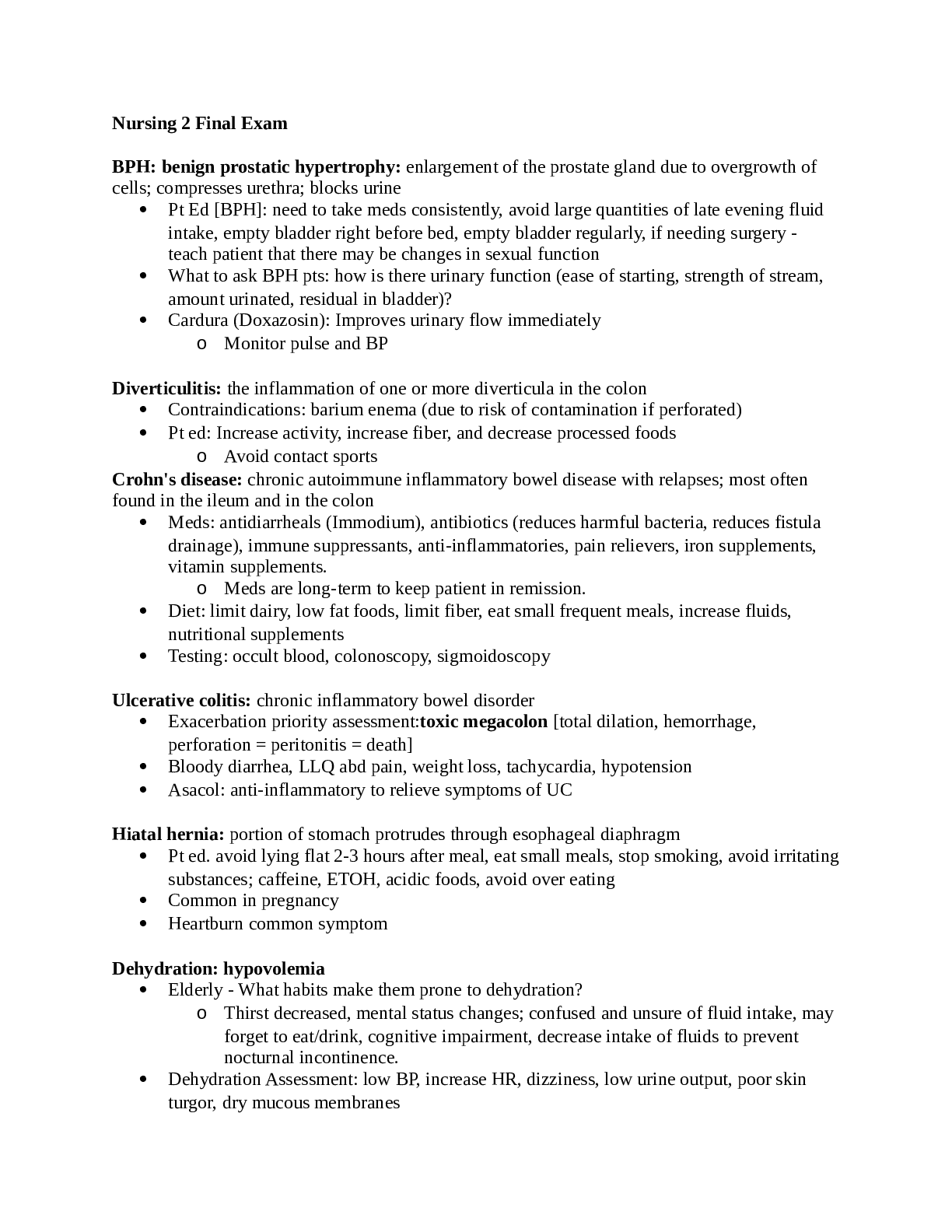
Buy this document to get the full access instantly
Instant Download Access after purchase
Add to cartInstant download
Reviews( 0 )
Document information
Connected school, study & course
About the document
Uploaded On
Sep 22, 2020
Number of pages
18
Written in
Additional information
This document has been written for:
Uploaded
Sep 22, 2020
Downloads
0
Views
48

